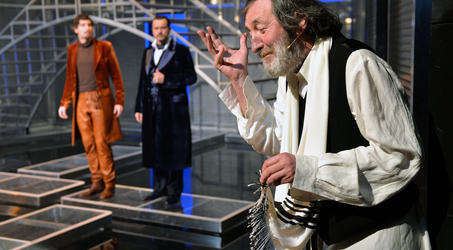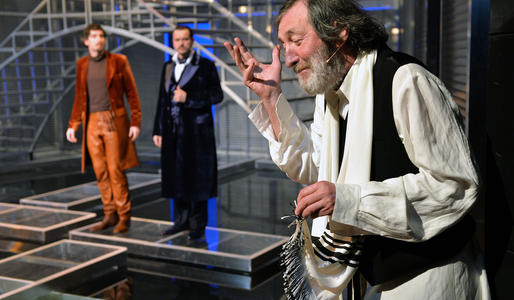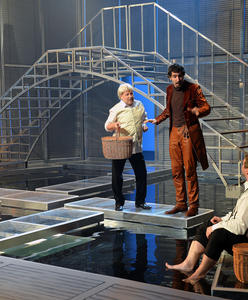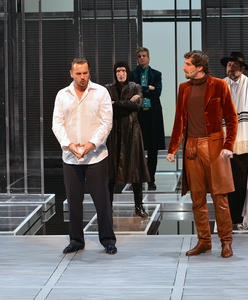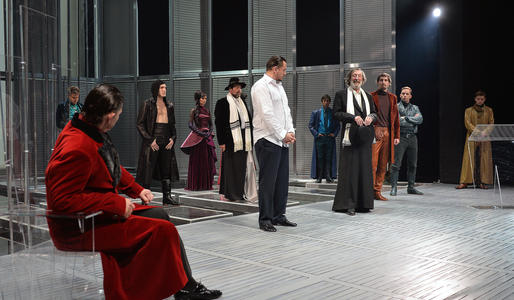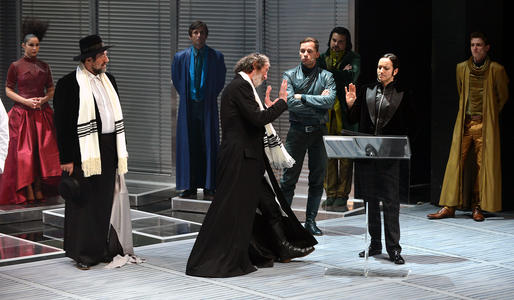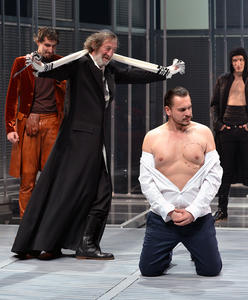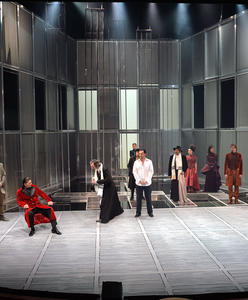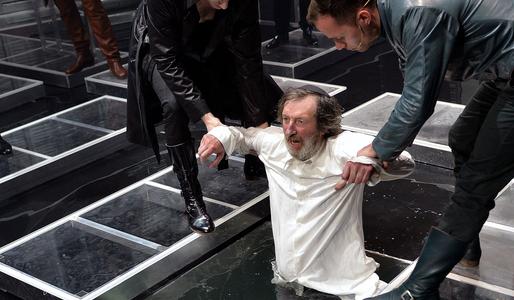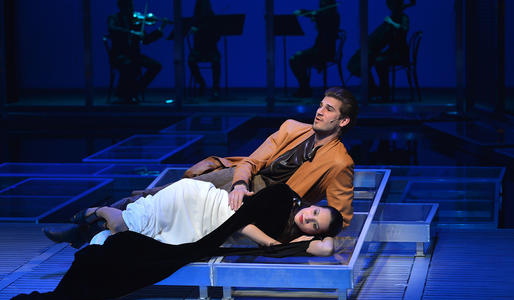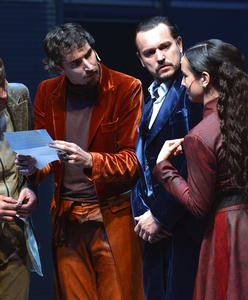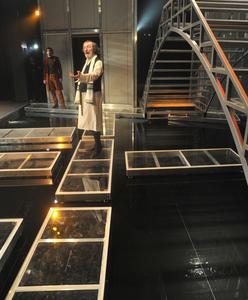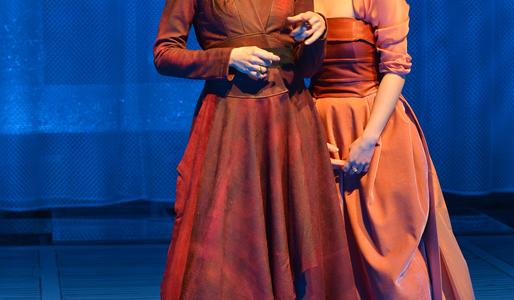The Merchant of Venice
Jiří P. Kříž 29. May 2014 zdroj Xantypa
Where should one start when praising Jiří Josek´s excellent translation of The Merchant of Venice? The Brno production features monologues which are omitted elsewhere, but you won´t be bored for a single second. The story of a dispute over a pound of flesh from the body of Venetian merchant Antonio as a warranty for a loan taken from the rich Jew Shylock in case the loan can’t be repaid in time has brought Boleslav Polívka back to Brno City Theatre. It was certainly he who became the most important acquisition of the production. He has already played Shylock in Hilský´s (and Feldek´s) translation and under Roman Polák´s direction at the Summer Shakespeare Festival at Prague Castle. At that time – in 2005 – the Merchant also visited the farm in Olšany which was still Bolek´s at that time. However, his new Shylock has surpassed the old Shylock in a unique way, including the part involving the Jew´s punishment for hatred – forced christening. In Brno, he is baptised like the ancient Christians were in the Jordan – by the immersion of his whole body in water. It isn´t said whether it is in a canal or in the lagoon, but people and their life stories are reflected in the waters of Venice’s Canal Grande. Odes could be composed about Polívka´s acting performance, and only those who remember his Mageri in Uhde, Štědroň and Pospíšil´s Ballad for a Bandit based on Ivan Olbracht´s work, luckily recorded forever as a film by Vladimír Sís, know that Shylock is the second Jew he has played. “Commander, Commander… Masters come and go but a person… a person stays.” Not only because of this is the character of the moneylender in The Merchant of Venice a less than dominant one. Dominance is rather the preserve of the rich heiress from Belmont, Portia, played by great Brno City Theatre personality Svetlana Janotová. Portia is perhaps the most emancipated, sharp-witted and clever woman to be found in Shakespeare´s extensive body of work, and Janotová’s performance is perfect, masterful! On top of this, there’s Zdenek Merta´s background music – a compact whole which supports the edited character of the production. In places, it evokes sweet Venezia, while at other times it accompanies the characters and their fates. Hats off to all aspects of this masterful production!
The story of the old dog named Shylock
Marcel Sladkowski 13. May 2014 zdroj Divadelní noviny
The involvement of a famous actor is just one of the attractions offered to theatregoers by Brno’s Merchant of Venice; another is the visually impressive stage and lighting. Scenographer Christoph Weyers has created a towering three-floor structure whose cold metal frame delimits the sides and back part of the stage. The regularity of the strictly symmetrical structure is broken up by the sometimes open blinds on each of the floors, giving a visual impression that makes reference to the fronts of Mediterranean houses and also, metaphorically, to the disruption of the order which develops the dramatic thread of the play. The Venetian setting is most obviously evoked by the area of water in front of the set pieces, which features a footbridge and islands with pavements. This setting enabled the plot to move forward dynamically when the action is taking place in the streets of Venice; these scenes stand out well in comparison with the scenes in Belmont, which are situated on an empty forestage in front of the curtain. Not even the power of Shakespearean dialogue can protect them from exhibiting a certain staticness.
The production also has to cope with the distinct typological diversity and comic stylization of its characters. This is true not only of rich Portia’s Belmont suitors (the soldierly, uncouth Moroccan prince played by Jakub Zedníček, and Patrik Bořecký’s Aragonian prince, whom he plays with transvestite-like effeminacy) but also of the Venetians: Milan Němec and Alan Novotný in the minor roles of Salerio and Solanio perform one dialogue as a parody of TV newsreaders. Michal Isteník´s Lancelot garners deserved attention with his brilliant study of a servant with the cunning of Sgaranelle. The erotic desire of the pairs of lovers in which the females dominate their counterparts mainly thanks to their goal-directed attitude also has comic features. This is the case with the desirous but disciplined Portia (Svetlana Janotová) and her similar friend Nerissa (Eliška Skálová), but also with Shylock´s daughter Jessica, whom Andrea Březinová moves light years away from the image of an unhappy creature suppressed by a grumpy parent: her Jessica is cheekily direct and she visibly doesn´t care about the pain she causes to her father, as his only child, by running away with a Christian boy and converting to his religion.
The fact that Shylock couldn’t have imagined his daughter would act in this way corresponds with the character traits which Boleslav Polívka has imprinted into this crucial character. His old Jewish merchant perhaps once used to be a feared trader, but time is against him and it reveals weaknesses which he’d been able to hide up until now. Polívka´s Shylock knows it and therefore is as wary as a wounded dog: from time to time, he does actually growl at people, which mostly provokes great laughter from the audience. However, Shylock uses these comic overtones as intentional mimicry with which he diverts attention or also gives warning if needed. Whenever he is being foxily cunning, greasily sly or carefully evasive, he acts so in accordance with the necessity to get by in the hostile environment in which he must operate. The loss of his daughter seems to suppress Shylock´s instinct for self-preservation: he asks for a pound of flesh to be cut from the chest of Antonio (played in sadly composed fashion by Petr Štěpán) with obstinate and bitter boastfulness. It seems during the court process that he has bet everything on the risky card of revenge. Boleslav Polívka develops Shylock’s changes and ambivalence excellently, occasionally managing to incorporate aspects of the same character which he embodied in a different manner at the Summer Shakespeare Festival nine years ago within his compact performance. Polívka´s Shylock deservedly holds the attention of the audience; moreover, he is also the centre of the strongest scene of the evening when Antonio´s requirement that Shylock be christened via immersion in the waters of the canal is executed upon him immediately after he loses the court trial. The little splashing waves in the pool of water had until then served only as an idyllically pleasant yet effective element throwing the reflections of lights on the set pieces and also allowing the servants to cool their tired feet. Suddenly, Shylock is literally swallowed up by the water. He emerges half-drowned, soaked on the outside and broken inside. This simple and brutally effective scene is the climax of the production.

